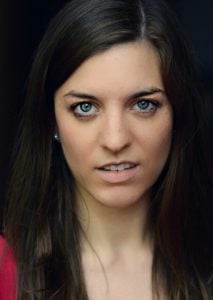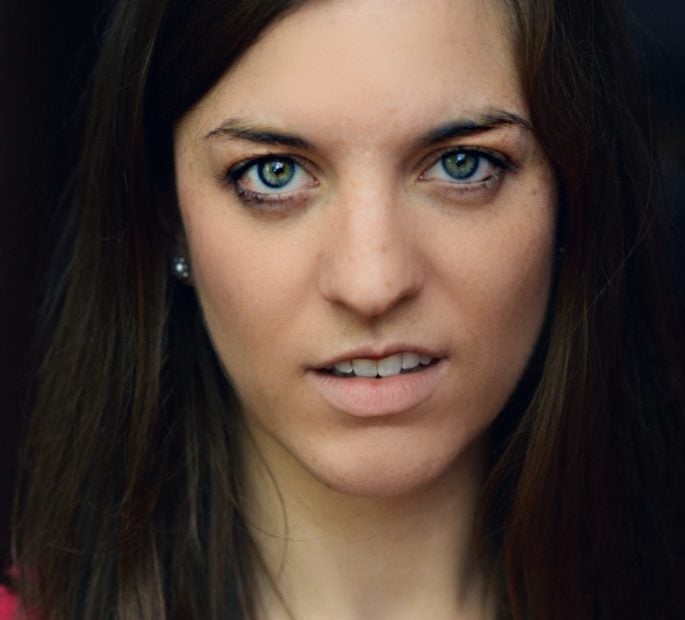 National New Play Network Playwright in Residence Emily Dendinger chats about her time at Curious and her play No Home for Bees, which has a reading tonight at Curious. Emily has been at Curious since early fall and will wind up her time with us next month. We thought it was time to get her take on the experience and thoughts on theatre today.
National New Play Network Playwright in Residence Emily Dendinger chats about her time at Curious and her play No Home for Bees, which has a reading tonight at Curious. Emily has been at Curious since early fall and will wind up her time with us next month. We thought it was time to get her take on the experience and thoughts on theatre today.
What does it mean to be the National New Play Network Playwright in Residence?
The National New Play Network is an amazing group of regional theatres that have come together to promote new work and playwrights. The Playwright in Residence program is a terrific opportunity for a young writer to spend a season working and writing at a theatre, developing their voice and craft and learning the ins-and-outs of a professional theatre. I was first introduced to Curious by Meridith Friedman, a past Curious resident and the playwright of next season’s The Luckiest People. Chip and I spoke on the phone and decided to apply for the residency together. I’ve spent my time at Curious writing, helping out in the education program and managing the literary department. Basically, it’s been my dream life—reading, writing, and teaching.
I also have been so impressed with how welcoming and talented the Denver theatre community is. I moved here from Chicago in October and couldn’t believe how kind, supportive and excited everyone was. Curious has become my home away from home, and it’s a gift for a writer just starting out to have a place they feel encouraged and nurtured.
Where did the idea for No Home for Bees come from?
In my last semester at graduate school, I wanted to write about something that scared me—something I found truly terrifying. I’m very close with my family and write a lot about families in general. The idea of someone I love committing an unforgivable act frightened me more than anything. I started to do research on the nature of sex crimes and the prison system, and everything I thought I knew was challenged. Often when I start writing a play, I try to see the topic or issue from all different sides, even when it gets scary or uncomfortable, but that’s where I often find the best plays live.
My plays deal a lot with empathy, especially for people we don’t automatically assume deserve it, but that’s what I find compelling and challenging. We live in a world that’s becoming increasingly sterile. Most interactions are through text, email, G-chat. Even phone calls are becoming obsolete. Theatre is one of the few places left where you can sit in a room with a group of people and share an experience together. The characters are in front of you and are being embodied by real people. You can’t walk away or turn it off or press replay. It’s almost a religious experience in that way. I grew up in a family of educators and was encouraged to ask lots of questions and then discover the answers for myself. My plays are often the products of that impulse and come from a place of wanting to know or understand.
What kind of theatre excites you?
I am drawn to plays that force us to have a conversation, that ask big, scary, unwieldy questions. I’m excited when I see something I’ve never seen before onstage—something unfamiliar or impossible. I’m drawn to good stories with engrossing, complicated characters. I’m a sucker for a love story. I love being surprised, both in a good way and a bad. There are certain plays that get under your skin and stay with you long after the curtain closes—those are my favorites.
What other big questions are on your mind these days?
Oh, wow. What questions am I not wrestling with? I’m currently working on a play about religious fanaticism right now called God Hates You. It was inspired by an article I read about the granddaughter of the founder of the Westboro Baptist Church, but it’s already leading to larger questions about religion in general. I was raised Catholic, but I wouldn’t consider myself practicing, yet I’m fascinated by how religion shapes people’s identity. While I’m interested in hearing from people who are believers, I’m equally as interested in people who do not believe. When I start working on a play, I like to talk to everyone and learn as much as I can.
I’m also in the beginning stages of research for play inspired by James Foley, the reporter beheaded by ISIS in 2014. While I’m interested in his journey, I’m more interested in his family’s quest to retrieve their son’s body.
What’s special about Curious’ audience?
What I love about Curious’ audience is that they come to the theatre with the expectation that they will be challenged. They are excited about engaging with tough subjects and plays and eager to have a conversation. The talkback aspect is part of the performance and so unusual compared to other theatres yet absolutely necessary to the kind of work Curious programs. The audience really is curious and that’s so refreshing.
What’s your biggest takeaway from this residency?
Honestly, it was sitting in on season selection. Every playwright should get this opportunity at least once. There were so many plays we loved that we couldn’t program for an assortment of reasons that often had nothing to do with the quality of the writing or the play itself. I found that so encouraging. It’s inspired me to put my work forward more and to look at rejection in a new way. Theatre really is a marathon, not a sprint, and I’m more aware now about how much persistence and patience matter, and that it really is about playing the long game.
What are you working on now?
As I mentioned, I’m working on my religion play, which will have a reading next month here at Curious. I’m also working on a play about the first female magician that’s part magic show, part traditional narrative that I’ve been developing as part of TimeLine Theatre’s Writer’s Group in Chicago.
